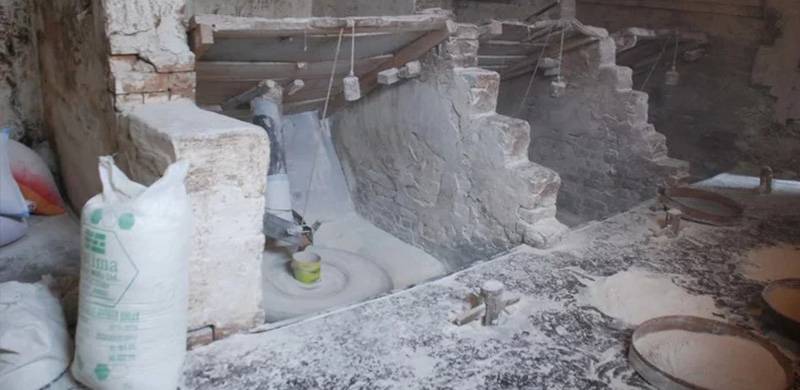
A group of teenagers swim in the river to cool themselves from the sweltering heat in the river about one and a half kilometre from the main Peshawar-Mohmand road in Khyber Pakhtunkhwa (KP). The river runs the traditional watermill, called jranda, in local Pashto language.
Jranda is an ancient mode of grinding wheat, corn, millet and other grains to produce flour. This traditional method of grinding grains that has been around for centuries is still used in Khyber Pakhtunkhwa (KP). In fact it is considered to be an environment-friendly mill as it is run on water. It makes a slight sound, which can only be heard by the man working it.
“Those who know the quality and taste of jranda-produced flour prefer it over flour ground in modern mills, this is why jranda has survived in KP. Otherwise, it would have withered away because of the onslaught of technology,” says 50-year-old Sadaat Khan, who is a jranda operator in the disputed area Daryab Korona of District Mohmand.
Sadaat Khan has been grinding flour on jranda from the last 25 years -- “I grind 10 to 12 thousand kilogrammes of grains during the day shift, and as much during the night shift. Only six watermills survive on the river near Shabqadar Bazar”.
Jranda runs on flowing water diverted from a river or stream. The force of water flow drives the blades of a turbine. It rotates an axle that drives the crushing stone, the passage of water is controlled by sluice gates that allow for maintenance and control of the speed of the grinding stones.
“We get three kilogrammes per thousand kilogrammes (mann) of flour as wage (mazz in local language). But people running electric grinding machines charge upto six kilogramme per thousand kilogrammes of wheat,” says Khan.
All the watermills in the area are owned by Khyber Pakhtunkhwa’s irrigation department, which leases them to successful bidders on a yearly basis.
Jranda is an ancient mode of grinding wheat, corn, millet and other grains to produce flour. This traditional method of grinding grains that has been around for centuries is still used in Khyber Pakhtunkhwa (KP). In fact it is considered to be an environment-friendly mill as it is run on water. It makes a slight sound, which can only be heard by the man working it.
“Those who know the quality and taste of jranda-produced flour prefer it over flour ground in modern mills, this is why jranda has survived in KP. Otherwise, it would have withered away because of the onslaught of technology,” says 50-year-old Sadaat Khan, who is a jranda operator in the disputed area Daryab Korona of District Mohmand.
“Those who know the quality and taste of jranda-produced flour prefer it over flour ground in modern mills, this is why jranda has survived in KP. Otherwise, it would have withered away because of the onslaught of technology,” says 50-year-old Sadaat Khan, who is a jranda operator in the disputed area Daryab Korona of District Mohmand.
Sadaat Khan has been grinding flour on jranda from the last 25 years -- “I grind 10 to 12 thousand kilogrammes of grains during the day shift, and as much during the night shift. Only six watermills survive on the river near Shabqadar Bazar”.
Jranda runs on flowing water diverted from a river or stream. The force of water flow drives the blades of a turbine. It rotates an axle that drives the crushing stone, the passage of water is controlled by sluice gates that allow for maintenance and control of the speed of the grinding stones.
“We get three kilogrammes per thousand kilogrammes (mann) of flour as wage (mazz in local language). But people running electric grinding machines charge upto six kilogramme per thousand kilogrammes of wheat,” says Khan.
All the watermills in the area are owned by Khyber Pakhtunkhwa’s irrigation department, which leases them to successful bidders on a yearly basis.

